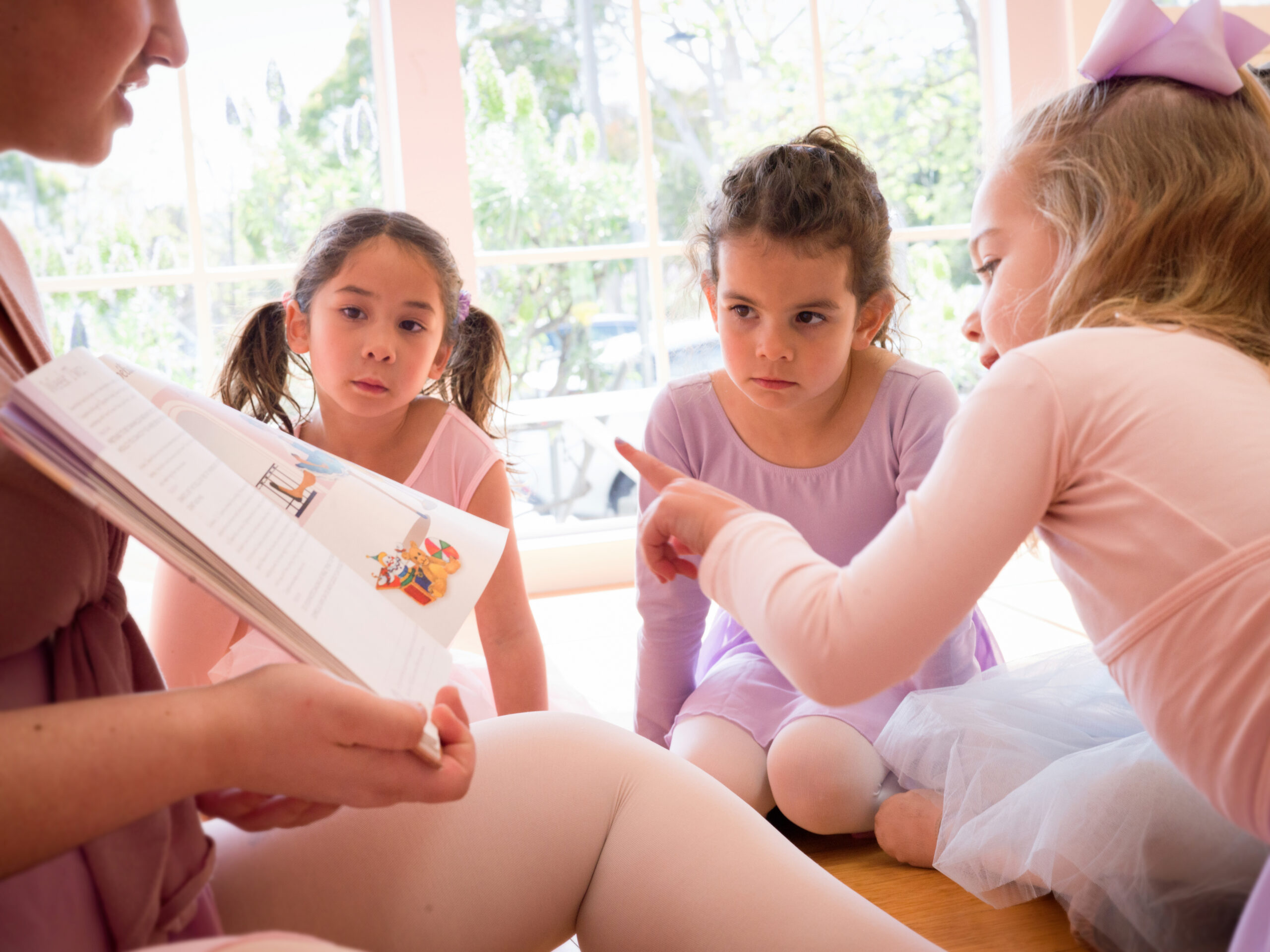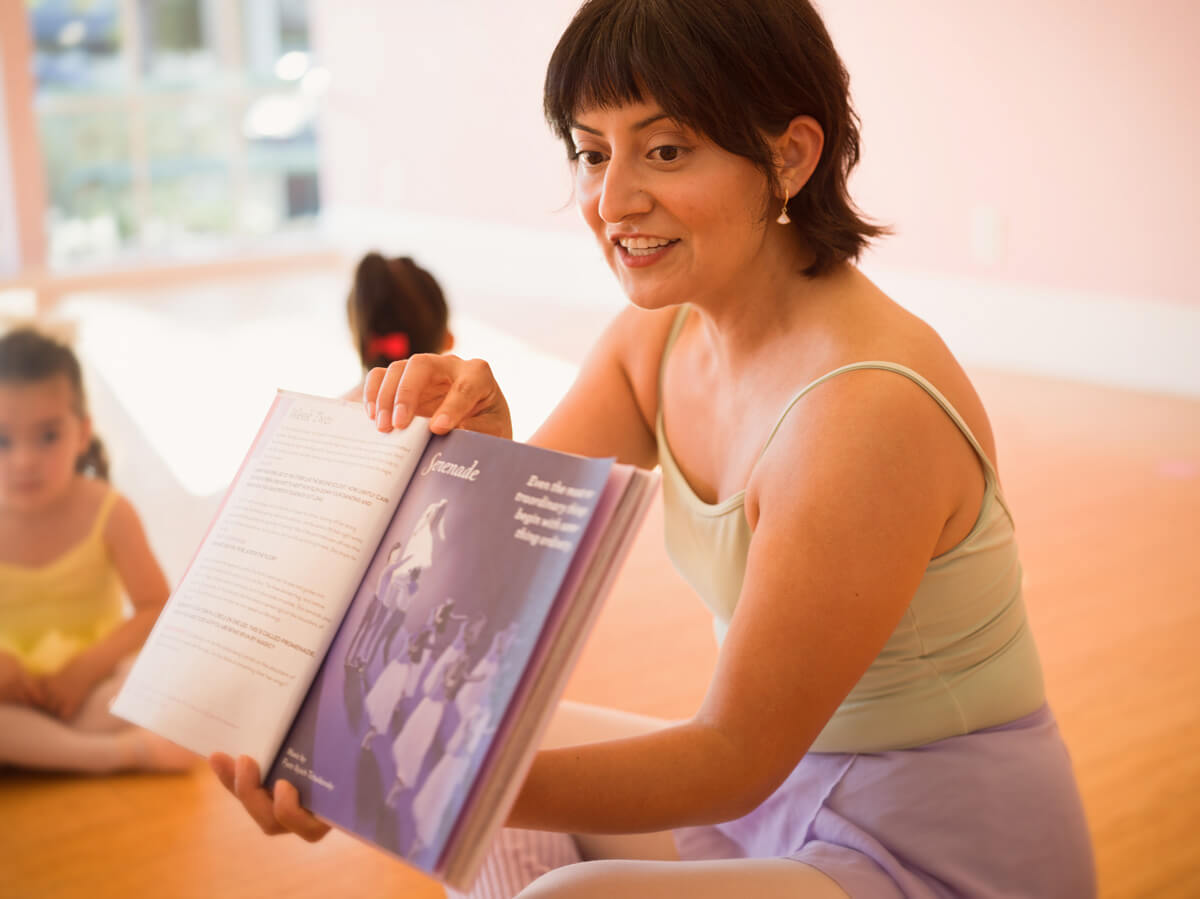Ballet for Babies? We’re So Glad You Asked.
The Joy of Play and Connection
We know what you’re thinking: how in the world does a baby learn ballet? But don’t worry– we’re not planning to put your baby at the barre or get their tiny toes into pointe shoes. Our aim for our Baby Ballet division is to expose our youngest twirlers to the magic of movement and music. Baby Ballet includes a 35-minute teacher-guided class that follows a carefully curated curriculum that is developmentally appropriate for infants aged 6-18 months, plus 10 minutes of open play & caregiver social time.
Tutu School’s founding principle is that every child should know what it feels like to dance. After over 17 years of helping toddlers learn the magic of ballet, we thought, “Why not babies, too?” Studies show that music is crucial to the development of little minds, fine motor skills, speech and memory development, and so much more. Pairing that with a variety of movement-based activities that foster their motor skills, social-emotional development, and cognitive abilities is a central component of our carefully crafted Baby Ballet curriculum. It’s not just a dance class; Baby Ballet is an amazing opportunity for your baby to grow and develop.
In every Baby Ballet class, dancers and caregivers can anticipate a safe environment to explore, thoughtfully crafted teacher-guided movement and body awareness activities, engaging infant-safe props and musical instruments, as well as a meaningful bonding opportunity for babies and caregivers. Each dancer and caregiver will be provided a mat for stretches and floor movements.
Carefully Crafted + Developmentally Appropriate
We have a variety of props that are used in Baby Ballet classes. Every prop used in class is baby-safe and has a clear purpose for your baby’s development. Here are a few props you might see in class:
Plastic Mirror – Did you know that mirrors are so important for developing babies? Mirrors are powerful tools for developing the concept of self-recognition. At this stage of development, looking at their own happy faces (and yours!) helps your baby learn how to focus their eyes, learn new words, move certain muscles, and explore the wonderful things a face can do.
Ribbon – Rings or wands with ribbons attached can be a helpful tool for babies to learn bodily stimulation, muscle coordination, and eye movement.
Small, soft balls – Whether you’re rolling the ball back and forth to your baby to encourage strong hands or coordination or letting your baby hold and squeeze the ball to encourage fine motor skills.
Foam mats – Similar to a yoga mat or exercise mat you might use in an adult fitness class, it’s important for little hands, feet, and knees to have a soft, plush space to play and explore. With every meaningful step or little stumble, you can have some peace of mind that your baby’s skin is protected.
This is just a small taste of what you might see in a Baby Ballet class. All of our Tutu Teachers have received specialized training to instruct these unique developmentally-focused dance classes, which is true of all our Tutu School classes. Throughout their training, Tutu Teachers are taught the fundamentals of early childhood education, and with the introduction of the Baby Ballet division, teachers have a new set of guidelines for working with and teaching babies aged 6 to 18 months.
Our carefully crafted lesson plans, designed by a team with both dance and early childhood development backgrounds, offer a variety of fun and appropriate activities for babies. Teachers are given to create their own wonderful activities, too, based on the abilities of each child and each class.

Tutu Teachers are trained to use class props in a variety of ways that stimulate development

Infant Developmental Milestones
We often think about Baby Ballet dancers in two distinct ways based on their current development: walkers and crawlers! This helps us shape the class for every baby’s needs. Tutu Teachers are set up for success with in-depth training and continued workshops that offer education on crucial infant development milestones. With these skills in every teacher’s back pocket, you can feel confident knowing that every time you take your baby to class, they’re learning skills that will help them blossom into a happy, healthy, and fully developed little human! Developmental milestones are physical, social, and emotional skills observed in how children play, act, speak, learn, and move. Even though there are research-based developmental milestones, each child develops at their own unique and perfect pace.
Around 3 months, infants develop object recognition, and by roughly 4-6 months, the majority of babies have begun or mastered the skill of rolling over in both directions. During this key development period, infants begin exploring the concept of cause and effect. These are the beginning stages of how infants make sense of the world. Infants communicate through sounds, gestures, and facial expressions. An infant is able to differentiate between variations in tone of voice around 6 months.
All of this is a key indicator that your baby is ready for Baby Ballet and is eager for the stimulation provided by dancing, music, and group play!
For Babies… And Caregivers, too!
Starting at just 6 months old, your baby can start their very first Tutu School class, which means you get to start your first Tutu School class, too! Baby Ballet is as much for caregivers as it is for the little ones. While some degree of caregiver participation is required, this class division has been specifically designed with the enjoyment of caregivers in mind. While you’re strengthening your bond with your baby, our hope with this division is that you might make some new dance friends too! Every Baby Ballet class has 10 minutes of caregiver socialization and open play built in, so you can kick-start new friendships with other grown-ups and their little ones.
Social support is also incredibly important for new parents. Whether this is your first baby or one of many, interacting with other caregivers who are also in the early postpartum period is essential to parental mental health and well-being. This is also an opportunity to share parenting resources with others. No one quite understands the complex feeling of this early stage of parenting like other caregivers going through the same thing. With such a diverse group of caregivers with a wide variety of parenting experiences in every class, we know that Baby Ballet is the perfect place to build community. Not to mention, being able to share in the excitement of seeing your little ones fall in love with the joy of dance is a beautiful thing to experience together.
While every Baby Ballet class is a little different, we think that this is a great opportunity for caregivers to experience the joy of music and movement, too! You don’t have to come to class in a tutu (but bonus points if you do!), gentle physical movement as you lift your baby into the air, or demonstrating how you might move arms to the music of a new song is helpful for postpartum bodies. Caregiver participation is required, but you’re able to get as much or as little physical movement as is right for your body.
Tutu School’s Ballet Storytime
One of the key components and unique features of a Tutu School’s class is our Ballet Storytime curriculum. During this whimsical section of ballet class, little dancers have the opportunity to learn about famous ballets and the accompanying music. This early introduction to this beautiful art form and classic music is a key tenet of Tutu School, and each and every level gets to enjoy Ballet Storytime in a way that fits their age group. Baby Ballet is no exception!
Baby Ballet includes an interactive storytime in which your Tutu Teacher shows the illustration of the week while playing the corresponding music, but instead of reading the story in its entirety, teachers are encouraged to point to the illustration and identify a couple of key concepts for babies to engage with.
Reading aloud is one of the simplest ways to boost our baby’s language, speech, and thought development. Most babies will soak in the words and might even mimic the sounds made! Our Ballet Storytime books have large, brightly colored pictures to make it easy for little eyes to see and explore each page. As your Tutu Teacher points to and names common objects, your baby will start to learn and recognize new words and objects. And the energetic storytelling from your teacher, with lots of fun facial expressions and fantastical voices, will be fun for your baby and for you.
Some of the renowned ballets we introduce our students to are The Nutcracker, Swan Lake, and one of the newest additions to our Ballet Storytime curriculum, Balanchine’s Jewels. These are just a few of the works your baby will get to see and explore in an age-appropriate way.
Plus, little ones naturally love music! Whether it’s soft and soothing or a lively tune, babies feel it both physically and emotionally. Music has been shown to improve the processing of music and speech sounds, boost concentration skills and productivity, and encourage early creativity. At Tutu School, all of our dancers are introduced to the classical music of our Storytime ballets and classic renditions of favorite songs. Both Tchaikovsky and Wheels on the Bus are staples in the average Baby Ballet class.

Our goal in the Baby Ballet division is to introduce our youngest dancers to an introduction to ballet through music, storytelling, and movement. We believe that exposing children at the earliest possible age to creativity that involves movement and music can only lead to good things.
What will be your baby’s favorite part of Tutu School? Are you already starting to see their interest in a story at bedtime, or maybe they’re always bouncing around to music in the car? While every baby is different, we’ve made sure that each little one will grow and develop their little minds and bodies.
Tutu School class registration is always ongoing, so sign up today to experience the magic of Baby Ballet!
other posts you might like
Newsletter


